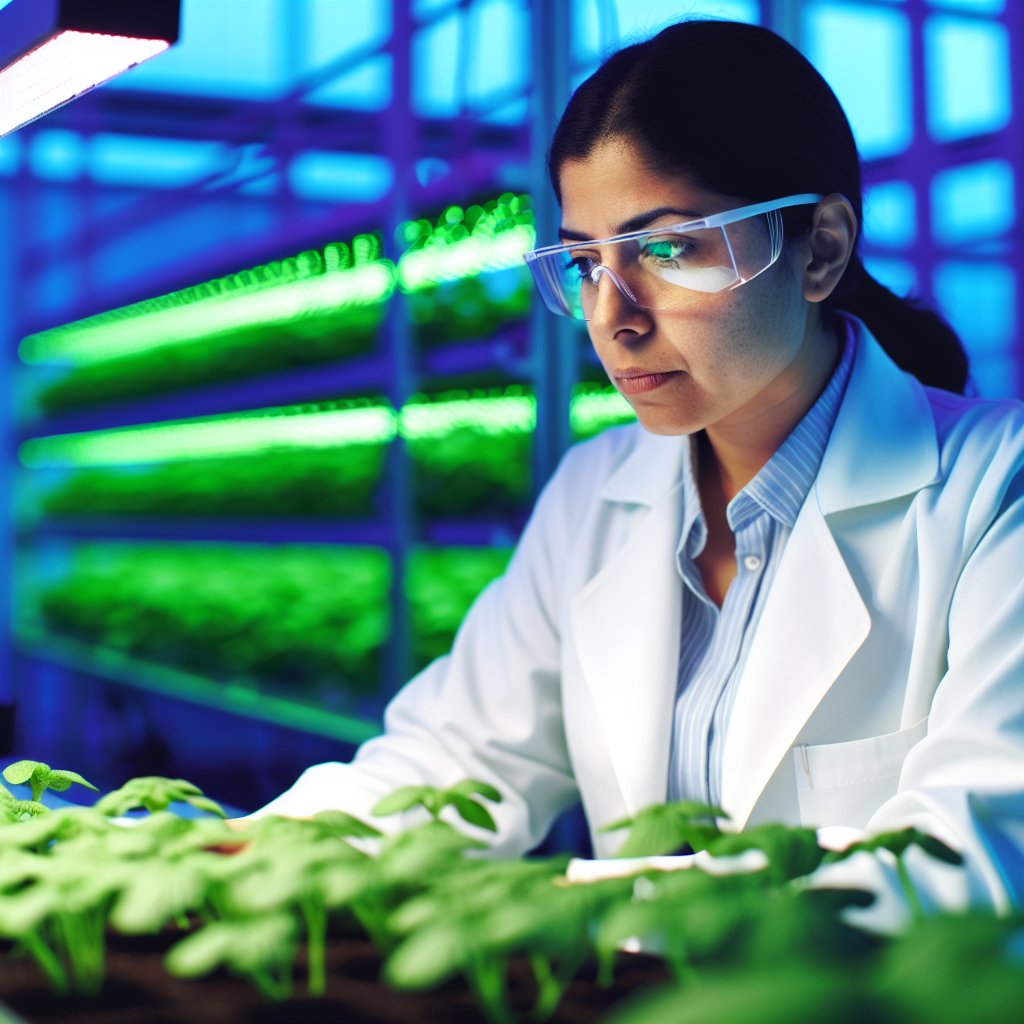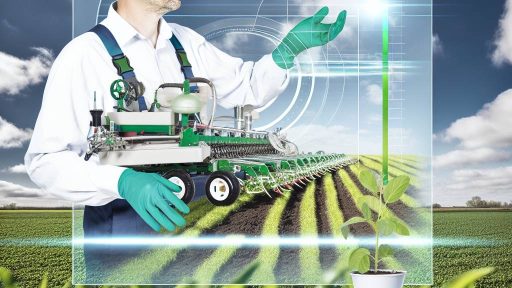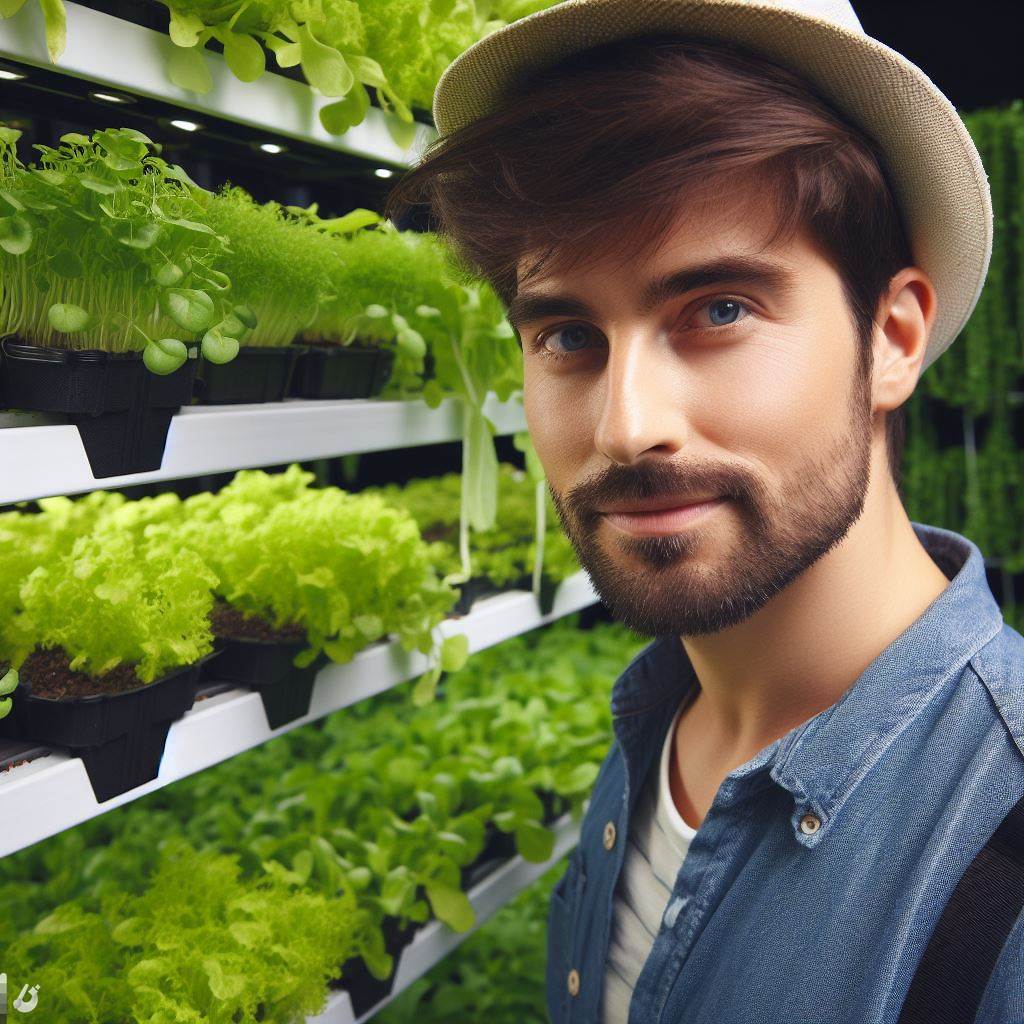Introduction to Biotechnology in Agriculture
Biotechnology significantly transforms agriculture practices today.
This innovative approach enhances crop yields sustainably.
Farmers face challenges such as climate change and pests.
Biotechnology offers solutions to mitigate these issues.
Understanding Biotechnology
Biotechnology refers to the use of living organisms in agriculture.
It involves genetic modification, tissue culture, and other techniques.
These methods improve crop traits like resistance and yield.
Applications of Biotechnology
Many applications exist within agricultural biotechnology.
- Genetically modified organisms (GMOs) improve pest resistance.
- Tissue culture propagates crops effectively and quickly.
- Marker-assisted selection accelerates traditional breeding methods.
Benefits of Biotechnology in Crop Production
Biotechnology enhances crop productivity significantly.
This method allows for the development of resilient crops.
Furthermore, it reduces the need for harmful pesticides.
Additionally, biotechnology can improve nutritional quality.
Challenges and Considerations
Despite its benefits, biotechnology faces challenges.
Public perception and regulatory issues require attention.
Moreover, ethical considerations often arise.
Transform Your Agribusiness
Unlock your farm's potential with expert advice tailored to your needs. Get actionable steps that drive real results.
Get StartedOverview of Crop Yield Challenges in Modern Farming
Increasing Global Population
The global population continues to grow at an unprecedented rate.
This trend results in higher food demand, pressing farmers to enhance crop production.
However, achieving this goal is not straightforward.
Climate Change Impacts
Climate change significantly affects agricultural productivity.
Farmers face fluctuating temperatures and unpredictable weather patterns.
Additionally, extreme weather events can devastate crops.
In essence, these changes complicate planning and harvests.
Pest and Disease Pressure
Crops are increasingly vulnerable to pests and diseases.
These threats can arise unexpectedly, affecting yield quality and quantity.
Moreover, the development of resistant pests exacerbates these challenges.
Soil Health Concerns
Soil health is a crucial factor in crop yield.
Depleted soils often struggle to support healthy plant growth.
Practices like monoculture further degrade soil quality over time.
Technological Adoption Challenges
Many farmers lack access to advanced agricultural technologies.
Financial constraints can hinder the adoption of new methods.
Furthermore, inadequate knowledge often prevents effective implementation.
Economic Pressures on Farmers
Farmers often face economic instability and market fluctuations.
Rising costs for seeds, fertilizers, and labor strain farm budgets.
These financial burdens can limit investment in yield-improving technologies.
Specific Biotechnology Techniques for Enhancing Yields
Genetic Engineering
Genetic engineering allows scientists to modify crops at the DNA level.
This technique can introduce desirable traits, such as pest resistance.
For instance, Bt corn produces a natural insecticide.
Consequently, farmers experience reduced pesticide use and higher yields.
Marker-Assisted Selection
Marker-assisted selection speeds up the breeding process.
Showcase Your Farming Business
Publish your professional farming services profile on our blog for a one-time fee of $200 and reach a dedicated audience of farmers and agribusiness owners.
Publish Your ProfileThis technique uses genetic markers to identify beneficial traits.
As a result, breeders can select superior plants more efficiently.
It enhances traits, including drought tolerance and disease resistance.
CRISPR Technology
CRISPR technology revolutionizes genetic modification.
This method allows precise changes to an organism’s genome.
For example, researchers can enhance nutritional content with CRISPR.
This technique has great potential for improving food quality.
Tissue Culture
Tissue culture enables the mass propagation of plants.
This method develops new plants from small tissue samples.
It ensures uniformity and disease-free plants for farmers.
Moreover, tissue culture supports the preservation of rare species.
Biopesticides and Biofertilizers
Biopesticides utilize natural organisms to control pests.
These alternatives minimize chemical pesticide usage.
Biofertilizers improve soil health and nutrient availability.
Thus, they enhance crop growth sustainably.
Precision Agriculture
Precision agriculture incorporates technology to optimize farming practices.
This approach uses sensors and data analytics for better decision-making.
Farmers can apply resources like water and fertilizers more efficiently.
As a result, they achieve higher yields while reducing waste.
Discover More: Energy Efficient Automated Machinery For Sustainable Farms
Case Studies of Successful Biotech Applications in Crop Production
Genetically Modified Crops for Increased Resilience
Biotechnology has revolutionized crop production worldwide.
Genetically modified (GM) crops exhibit enhanced resilience to environmental stresses.
For example, Monsanto’s Bt cotton has significantly reduced pest damage.
This advancement has empowered farmers to achieve higher yields consistently.
Additionally, the reduced pesticide usage benefits both the environment and consumers.
Enhanced Nutritional Content Through Biofortification
Biofortification improves the nutritional quality of staple crops.
A notable success story is Golden Rice, enriched with vitamin A.
This crop aims to combat Vitamin A deficiency in developing countries.
Farmers report better health outcomes in communities consuming Golden Rice.
Such biofortified crops offer a sustainable way to enhance nutrition globally.
Developing Drought-Resistant Varieties
Drought conditions threaten food production in many regions.
Research by Syngenta has led to the creation of drought-resistant corn varieties.
These varieties maintain yield stability even in arid conditions.
This innovation enables farmers to cultivate corn where it was previously unfeasible.
Moreover, it helps secure food supplies in water-scarce environments.
Precision Agriculture and Biotechnology
Precision agriculture integrates biotechnology for optimal crop management.
Tools like CRISPR enhance targeted breeding techniques.
For instance, BASF employs CRISPR to develop disease-resistant soybean varieties.
This approach reduces reliance on chemical treatments, promoting sustainability.
Farmers using these techniques report increased efficiency and reduced waste.
Showcase Your Farming Business
Publish your professional farming services profile on our blog for a one-time fee of $200 and reach a dedicated audience of farmers and agribusiness owners.
Publish Your ProfilePartnerships and Collaborations in Biotech Innovations
Collaboration enhances the success of biotech applications in agriculture.
Cargill partners with research institutions to develop improved seed varieties.
Such partnerships foster innovation and accelerate research into practical solutions.
Additionally, sharing expertise allows for better adaptation to local conditions.
This collective effort addresses challenges faced by farmers globally.
Find Out More: Regulatory Guidelines For Growing Genetically Modified Crops
Impact of Genetically Modified Organisms (GMOs) on Crop Yields
Introduction to GMOs
Genetically modified organisms play a significant role in modern agriculture.
They offer solutions to various challenges faced by farmers.
Moreover, GMOs increase crop resilience against pests and diseases.
Boosting Yields
GMOs contribute to higher agricultural yields across many crops.
For instance, Bt cotton enhances cotton production by warding off insects.
Similarly, herbicide-resistant soybeans allow for more efficient weed management.
This leads to a direct increase in the quantity of harvest.
Environmental Benefits
Utilizing GMOs can also have positive environmental implications.
For example, reduced pesticide use minimizes chemical runoff into waterways.
This helps maintain healthy ecosystems and promotes biodiversity.
Additionally, GMOs often require less land to produce the same output.
Economic Impact on Farmers
Farmers benefit economically from adopting GMO crops.
Higher yields translate to increased revenue for farming families.
Furthermore, reduced input costs lead to better profit margins.
Farmers of crops like corn and soybean often report significant financial gains.
Concerns and Considerations
Despite the benefits, GMOs raise some concerns among consumers and advocacy groups.
These concerns include potential health risks and environmental effects.
Public perceptions often influence the acceptance of GMO crops.
Therefore, transparent communication about GMO safety is essential.
Future of GMOs in Agriculture
The future of GMOs looks promising as technology continues to advance.
New innovations aim to enhance crop traits even further.
Future developments include drought-resistant crops to combat climate change.
Ultimately, effective use of GMOs can lead to sustainable farming solutions.
Find Out More: Enhancing Crop Production Efficiency with Controlled Environment Agriculture

Role of CRISPR Technology in Crop Improvement
Introduction to CRISPR Technology
CRISPR technology revolutionizes crop improvement strategies.
It offers precise editing of genetic material in plants.
This technology enhances traits like yield and disease resistance.
Mechanism of CRISPR
CRISPR works by targeting specific DNA sequences.
It uses a guide RNA to locate the desired gene.
Next, the Cas9 enzyme cuts the DNA at that location.
This process allows for modifications to plant genomes.
Benefits of CRISPR in Agriculture
CRISPR enables faster development of improved crop varieties.
This technology can reduce the time needed for breeding.
Additionally, it enhances genetic diversity among crops.
Showcase Your Farming Business
Publish your professional farming services profile on our blog for a one-time fee of $200 and reach a dedicated audience of farmers and agribusiness owners.
Publish Your ProfileEnhancing Disease Resistance
CRISPR can create crops resistant to specific pathogens.
For example, scientists have developed blight-resistant wheat.
This advancement minimizes crop losses and increases yields.
Improving Nutritional Quality
CRISPR technology enhances key nutritional traits in crops.
Researchers have engineered rice with increased vitamin A levels.
This biofortification addresses malnutrition in developing countries.
Promoting Climate Resilience
With climate change, crops must adapt to new conditions.
CRISPR aids in developing drought-resistant varieties.
Such adaptations can secure food supply in changing climates.
Challenges and Considerations
Despite its advantages, CRISPR faces regulatory hurdles.
Public perception of genetically modified organisms also poses challenges.
Thus, effective communication is crucial for acceptance.
Future Perspectives
The future of CRISPR in crop improvement looks promising.
As research advances, we can expect more breakthroughs.
CRISPR technology will likely play a key role in sustainable agriculture.
Uncover the Details: Organic Pest Control Innovations Promoting Eco-Friendly Farming
Sustainability and Environmental Considerations of Biotech Solutions
Impact on Biodiversity
Biotechnology can enhance agricultural biodiversity.
This approach supports various plant and animal species.
Moreover, it encourages more resilient ecosystems.
Balanced ecosystems can better withstand pests and diseases.
Reduction of Chemical Inputs
Biotech solutions often reduce the need for chemical pesticides.
This decrease leads to less chemical runoff into water sources.
Consequently, soil health improves over time.
Farmers can rely more on natural pest control methods.
Water Conservation
Advanced biotech can optimize water usage in crops.
Drought-resistant varieties require less water to thrive.
This conservation is crucial in water-scarce regions.
Efficient water use enhances crop sustainability.
Climate Resilience
Biotechnology plays a vital role in adapting to climate change.
Engineered crops can tolerate extreme weather conditions.
Such resilience helps maintain consistent yields.
Farmers face fewer losses due to climate variability.
Long-Term Soil Health
Many biotech methods promote healthier soils.
For instance, genetically modified crops can improve soil structure.
These practices enhance nutrient cycling within the soil.
Healthy soils sequester more carbon, benefiting the environment.
Future Trends in Biotechnology and Crop Yield Enhancement
Innovative Genetic Modification Techniques
Genetic modification continues to evolve with cutting-edge techniques.
CRISPR technology revolutionizes how we edit genes in crops.
This method enhances precision and efficiency in genetic alterations.
As a result, crops exhibit improved resistance to diseases.
Showcase Your Farming Business
Publish your professional farming services profile on our blog for a one-time fee of $200 and reach a dedicated audience of farmers and agribusiness owners.
Publish Your ProfileMoreover, these innovations lead to higher yields without chemical inputs.
Sustainable Agricultural Practices
Sustainability is at the forefront of modern agricultural biotechnology.
Farmers increasingly adopt practices that support environmental health.
Integrating biotechnology with organic farming is gaining traction.
These methods minimize chemical fertilizers and pesticides usage.
Consequently, the overall health of ecosystems improves.
Digital Agriculture and Data Analytics
Digital technology is reshaping agriculture through data analytics.
Farmers utilize data to make informed decisions about crop management.
Precision agriculture maximizes productivity while minimizing waste.
Farmers can track soil health, moisture levels, and pest activity.
This approach results in targeted interventions that boost yields.
Collaboration Across Industries
Partnerships between researchers and agricultural companies are expanding.
Collaboration fosters innovation in biotechnological applications.
Multiple stakeholders aim to address global food security challenges.
These alliances lead to breakthroughs that enhance crop resilience.
As a result, sustainable food production systems are strengthened.
Consumer Acceptance and Education
Public acceptance of biotechnology is crucial for its advancement.
Educational initiatives help inform consumers about biotechnological benefits.
Transparency in food production fosters trust among consumers.
As awareness grows, consumers are more open to biotech solutions.
This shift can significantly impact the future of crop production.




